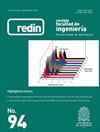热带地区水量、水质和沉积物监测网络的重新设计
IF 0.5
Q3 ENGINEERING, MULTIDISCIPLINARY
Revista Facultad De Ingenieria-universidad De Antioquia
Pub Date : 2020-02-21
DOI:10.17533/udea.redin.20191150
引用次数: 0
摘要
位于哥伦比亚安蒂奥基亚的CORNARE地区需要重新设计其水量、水质和沉积物监测网络,以便收集令人信服的数据,帮助决策者应对不同的技术和环境问题。鉴于该地区大部分地区无法获得历史数据,本文提出了一种基于二手信息的方法,该方法利用地理信息系统(gis)工具和该地区的知识。虽然应用物理、人为和经济因素的主要方法对所有网络都是相同的,但对该地区的水量、质量和沉积物网络采用了具体的策略。这些方法使用了专家标准和权距法。结果令人满意。对CORNARE区域监测的场址进行了宏观定位,这表明拟议的方法适用于安第斯热带流域,那里的历史数据不足,不允许使用更复杂的技术。该方法将水量、水质和沉积物整合到一个综合水文监测网络中。本文章由计算机程序翻译,如有差异,请以英文原文为准。
Redesign of a water quantity, quality, and sediment-monitoring network in a tropical region
The CORNARE region, located in Antioquia (Colombia), required a redesign of its water quantity, quality, and sediment-monitoring network, in order to collect convincing data to help decision-makers to respond to different technical and environmental issues. This paper proposes a methodology which is based on secondary information and which employs Geographical Information System –GIS- tools and knowledge of the region, given that historical data are unavailable in most of the region. Although the main methodology, which applied physical, anthropic, and economic factors was the same for all networks, specific strategies were used for water quantity, quality, and sediment networks in the region. These used expert criteria and weight distance methods. The results were satisfactory. Macro-location was implemented for the sites monitored in the CORNARE region, and this indicated that the proposed methodology was adequate for tropical Andean watersheds, where historical data were insufficient and did not permit the use of more complex techniques. This methodology integrates water quantity, water quality and sediment in an integrated hydrological monitoring network.
求助全文
通过发布文献求助,成功后即可免费获取论文全文。
去求助
来源期刊
CiteScore
2.00
自引率
0.00%
发文量
27
审稿时长
2 months
期刊介绍:
Revista Facultad de Ingenieria started in 1984 and is a publication of the School of Engineering at the University of Antioquia.
The main objective of the journal is to promote and stimulate the publishing of national and international scientific research results. The journal publishes original articles, resulting from scientific research, experimental and or simulation studies in engineering sciences, technology, and similar disciplines (Electronics, Telecommunications, Bioengineering, Biotechnology, Electrical, Computer Science, Mechanical, Chemical, Environmental, Materials, Sanitary, Civil and Industrial Engineering).
In exceptional cases, the journal will publish insightful articles related to current important subjects, or revision articles representing a significant contribution to the contextualization of the state of the art in a known relevant topic. Case reports will only be published when those cases are related to studies in which the validity of a methodology is being proven for the first time, or when a significant contribution to the knowledge of an unexplored system can be proven.
All published articles have undergone a peer review process, carried out by experts recognized for their knowledge and contributions to the relevant field.
To adapt the Journal to international standards and to promote the visibility of the published articles; and therefore, to have a greater impact in the global academic community, after November 1st 2013, the journal will accept only manuscripts written in English for reviewing and publication.
Revista Facultad de Ingeniería –redin is entirely financed by University of Antioquia
Since 2015, every article accepted for publication in the journal is assigned a DOI number.

 求助内容:
求助内容: 应助结果提醒方式:
应助结果提醒方式:


